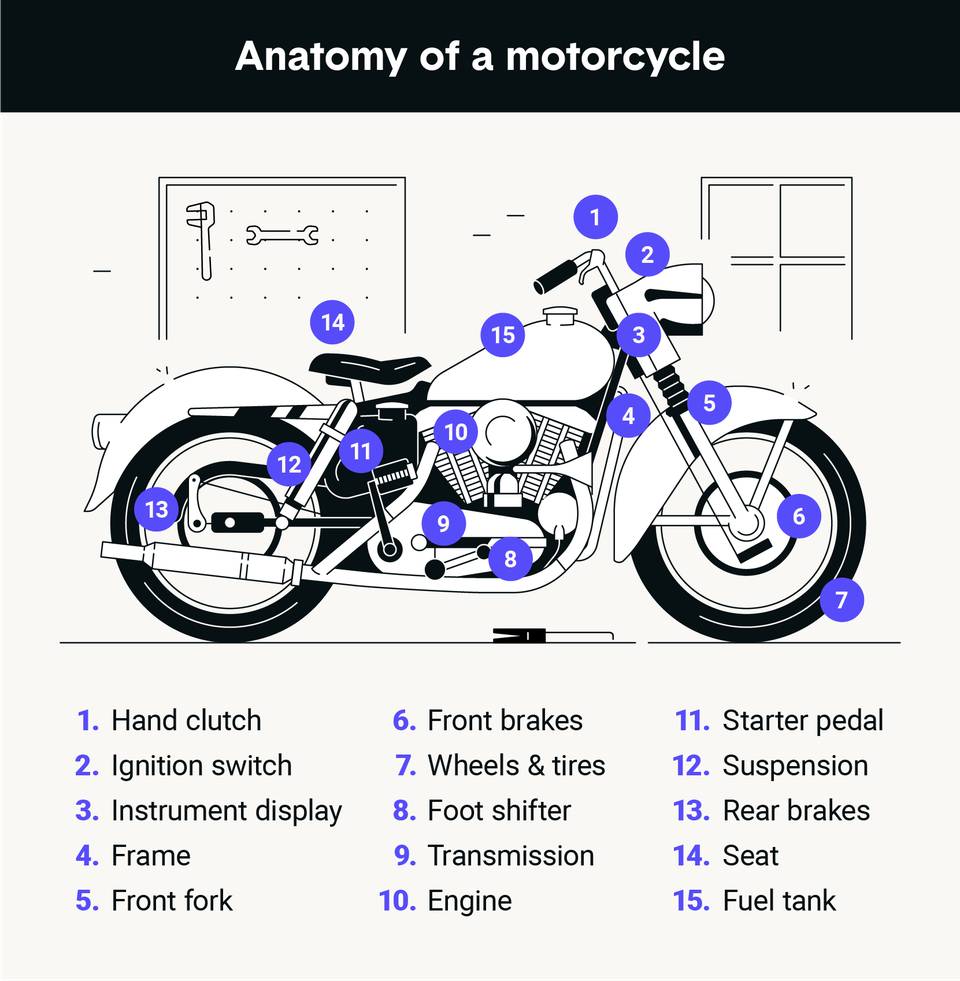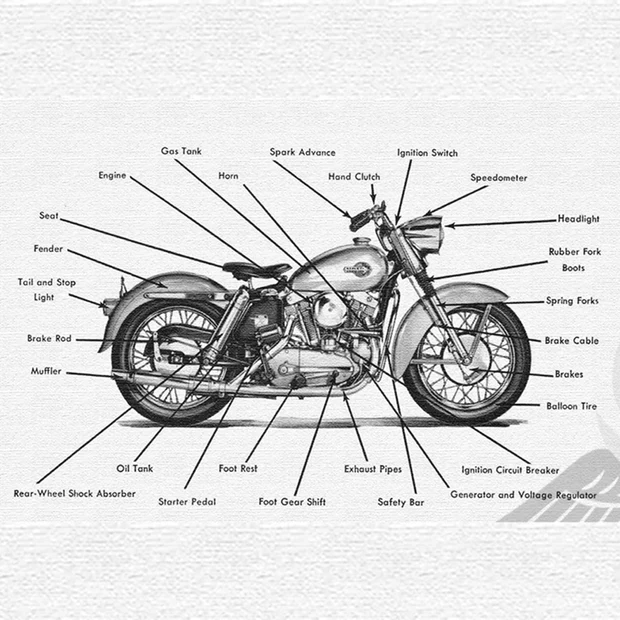Mechanic-Approved Advice Using Motorbike Components NZ
Mechanic-Approved Advice Using Motorbike Components NZ
Blog Article
Discover the Necessary Motorcycle Parts You Required for Optimal Performance
Understanding the crucial parts of a motorbike is basic for accomplishing peak performance. Each element, from the engine to the stopping system, plays a crucial role in overall performance and safety and security. Normal maintenance can prevent unexpected failings and improve the riding experience. Nonetheless, several cyclists forget the ins and outs of these systems. Finding exactly how they collaborate can result in a more effective ride. What important parts should every cyclist focus on?
The Engine: The Heart of Your Motorcycle
The engine acts as the core element of a motorbike, driving its performance and specifying its abilities. It is responsible for converting fuel right into power, which powers the bike ahead. Numerous kinds of engines are utilized, including single-cylinder, V-twin, and inline setups, each offering distinct characteristics suited for various riding designs and functions. The engine size, normally measured in cubic centimeters (cc), significantly influences performance, with larger engines usually supplying even more power and torque.Furthermore, the engine's design and modern technology, such as fuel injection systems or air-cooling versus liquid-cooling, impact effectiveness and dependability. Maintenance is essential for peak operation; variables like normal oil modifications and checking stimulate plugs assurance long life. Cyclists usually take into consideration an engine's responsiveness and smoothness, as these characteristics improve the general riding experience. Ultimately, the engine stays a crucial aspect that specifies not just the bike's performance but likewise the cyclist's link to the machine.
The Transmission: Changing Gears Smoothly
The transmission plays a vital duty in a motorbike's efficiency, particularly in the technicians of gear shifting. Understanding exactly how to move gears smoothly can boost the general riding experience, while regular maintenance warranties peak capability. Proper focus to these elements can considerably influence the longevity and efficiency of the motorcycle.

Equipment Shifting Mechanics
Smooth equipment shifting is essential for optimal motorcycle performance, greatly affecting both acceleration and control. The technicians of gear changing involve the interaction in between the clutch, equipment bar, and transmission system. When a cyclist involves the clutch, it disengages the engine from the transmission, permitting for an equipment change without damaging the elements. A well-timed launch of the clutch, incorporated with exact motion of the equipment bar, helps with a seamless change between gears. This process guarantees that the engine runs within its best power band, boosting efficiency. Motorcycle Parts Auckland. Furthermore, understanding the equipment proportions and their effect on speed and torque can aid bikers make notified selections during shifts, ultimately adding to a more responsive and satisfying riding experience
Upkeep Tips Importance
Regular maintenance plays an essential role in assuring that the transmission system runs effectively, permitting smooth equipment changes. Frequently altering the transmission and checking liquid is crucial, as old liquid can result in boosted rubbing and wear. Additionally, checking the clutch for wear guarantees peak interaction and disengagement, preventing slippage throughout equipment adjustments. Lubrication of moving components is similarly important to decrease rubbing and boost efficiency. Motorbike proprietors ought to also monitor for leakages and unusual noises, as these can suggest underlying concerns. By adhering to these upkeep suggestions, riders can extend the lifespan of their transmission system, assuring that gear changes continue to be smooth and adding to the general efficiency of their motorcycle.
The Braking System: Ensuring Safety on Every Trip
Braking systems are essential elements that straight influence a motorcycle's safety and security and performance. They contain different components, including brake pads, blades, calipers, and hydraulic lines, all collaborating to ensure reliable slowdown. The type of stopping system-- normally either disc or drum-- affects responsiveness and quiting power.Regular upkeep is important to copyright peak efficiency; used brake pads can result in lowered efficiency and raised stopping ranges. In addition, the high quality of brake liquid should be monitored, as it can take in wetness in time, jeopardizing braking efficiency.Riders should likewise consider the value of anti-lock braking systems (ABDOMINAL), which protect against wheel lockup during sudden stops, enhancing total safety and security. Appropriately operating brakes are not simply about stopping; they impart self-confidence in the motorcyclist, enabling for more secure navigation through different terrains. Ultimately, a reliable braking system is critical for delighting in every adventure with peace of mind.
The Suspension: Enhancing Convenience and Control
A well-functioning shock absorber substantially adds to a motorbike's overall performance, matching the effectiveness of the stopping system. The suspension plays a considerable duty in taking in shocks from unequal surfaces, assuring a smoother trip while maintaining tire contact with the roadway. This call is necessary for both security and control, allowing bikers to browse edges with confidence and precision.Different kinds of shock click for more absorber, such as telescopic forks or mono-shocks, supply varying levels of convenience and handling. Effectively tuned suspension enhances responsiveness, giving the motorcyclist with an extra connected feeling to the motorcycle. Normal upkeep checks are very important to identify the suspension elements, consisting of springtimes and dampers, are functioning at their finest. An efficient suspension system not just elevates the riding experience but additionally adds to the durability of various other motorbike components by decreasing deterioration. Consequently, spending in high quality suspension is vital for any type of severe motorcycle fanatic.
The Tires: Linking You to the Roadway
Tires play a crucial duty in a motorcycle's performance, functioning as the main web link in between the road and the rider. Understanding the various sorts of tires available can considerably affect handling and safety. Furthermore, regular maintenance is essential to guarantee peak tire efficiency and longevity.
Tire Types Explained
Just how do different tire kinds influence a motorbike's performance? Tire types play a crucial duty in determining a motorbike's handling, hold, and security. Sport tires, designed for high efficiency, deal improved traction and responsiveness on smooth roadways, making them suitable for competing and aggressive riding. Alternatively, touring tires prioritize toughness and comfort, providing a smoother adventure for long-distance travel. Off-road tires, defined by their tough tread patterns, excel in grip on unpaved surface areas, ideal for journey enthusiasts. In addition, dual-sport tires mix features from both off-road and on-road classifications, dealing with functional riding needs. Eventually, picking the best tire kind is crucial for enhancing performance, guaranteeing security, and boosting the overall riding experience.
Upkeep Tips Offered
While riding when reference driving, keeping excellent tire condition is essential for safety and performance. Consistently inspecting tire pressure is vital, as under-inflated tires can result in bad handling and increased wear. It is a good idea to evaluate tread deepness regularly; used tires concession grip and security. Furthermore, bikers must try to find signs of damages, such as lumps or cracks, which can suggest the requirement for substitute. Rotating tires occasionally assures also wear, enhancing long life. Keeping tires tidy from debris and avoiding excessive aesthetics can extend their lifespan. Ultimately, keeping proper positioning and balance adds to come to a head efficiency, lessening stress on various other bike components. Following these upkeep pointers will considerably improve the general riding experience.
The Gas System: Sustaining Performance and Efficiency
The fuel system plays an important role in making best use of a motorbike's efficiency and effectiveness, as it assures the ideal delivery of fuel to the engine. It consists of numerous essential parts, consisting of the fuel tank, fuel pump, fuel filter, and fuel injectors or carburetor. Each part has to function properly to guarantee a smooth and effective ride.The gas container stores gas and provides it to the engine using the gas pump, which creates the necessary pressure. A fuel filter prevents contaminants from entering the engine, while the injectors or carburetor mix gas with air for combustion.Proper upkeep of the fuel system is crucial; a clogged up filter or malfunctioning injector can bring about lowered efficiency and raised gas consumption. By verifying that the gas system operates efficiently, motorcyclists can take pleasure in improved throttle feedback, much better gas economic situation, and overall boosted riding experience.
The Electrical System: Powering Your Experience
An effective electric system is crucial for the general functionality and safety and security of a motorcycle, as it powers vital components such as the ignition, lighting, and various digital systems. This system includes the battery, which shops power, and the generator, in charge of producing power while the engine runs. The electrical wiring harness links these components, guaranteeing trusted power distribution.Additionally, integrates safeguard see this the system from overloads, while relays aid control high-current gadgets with low-power signals. A properly maintained electric system enhances performance by making certain smooth beginnings and constant operation of signals and lights, important for rider presence and safety.Regular checks of the battery's charge and links are necessary for preventing electric failings. Motorcyclists should additionally check wiring for damage, guaranteeing all parts work ideally. Inevitably, a durable electrical system adds significantly to the total performance and reliability of the motorcycle.
Frequently Asked Concerns
Just how Commonly Should I Change My Motorcycle's Battery?
The frequency of bike battery substitute relies on use and maintenance (Motorbike Components NZ). Normally, batteries need to be changed every 3 to 5 years. Normal checks can help determine when a substitute is essential for peak performance
What Tools Do I Need for Standard Bike Upkeep?
For basic motorcycle maintenance, one needs essential tools such as a socket collection, wrenches, screwdrivers, pliers, tire stress scale, and a torque wrench. These devices facilitate effective upkeep and ensure the motorbike runs effectively and securely.
Exactly How Can I Enhance My Motorbike's The rules of aerodynamics?
To boost bike the rules of aerodynamics, one must take into consideration adjusting fairings, using windscreen extensions, enhancing body position, and minimizing total weight. These modifications aid minimize drag, improving security and gas performance during experiences.
What Are the Indicators of a Failing Electrical System?
Indications of a stopping working electrical system include dimming lights, difficulty starting, uneven tool analyses, and blown integrates. Motorcycle Spares Christchurch. Unusual smells or deterioration around battery terminals may likewise indicate underlying issues requiring immediate focus for safety and security and efficiency

How Do I Choose the Right Oil for My Motorcycle?
When selecting oil for a motorcycle, one ought to think about the maker's specifications, thickness scores, and the kind of riding. Furthermore, standard versus synthetic oil can influence efficiency and engine security, influencing the choice significantly. The engine size, usually gauged in cubic centimeters (cc), substantially affects performance, with larger engines normally providing even more power and torque.Furthermore, the engine's style and innovation, such as fuel injection systems or air-cooling versus liquid-cooling, influence effectiveness and dependability. A well-functioning suspension system substantially adds to a motorbike's total performance, complementing the effectiveness of the braking system. The fuel system plays a vital role in maximizing a motorcycle's efficiency and efficiency, as it ensures the optimum shipment of gas to the engine. A fuel filter prevents contaminants from going into the engine, while the injectors or carburetor mix gas with air for combustion.Proper maintenance of the fuel system is crucial; a blocked filter or malfunctioning injector can lead to lowered efficiency and boosted fuel intake. A well-kept electrical system boosts efficiency by ensuring smooth starts and regular procedure of signals and lights, essential for cyclist visibility and safety.Regular checks of the battery's fee and connections are important for stopping electrical failings.
Report this page